Loners,
Have you ever wondered where all our guitars, amps, keyboards, and production equipment are stored? What about 25 years’ worth of magazine clippings, Juno Awards, unopened MPC players, vinyl test pressings of our early albums? And all those backdrops we hang behind the stage—visual artifacts from each album and touring cycle?
Well, for most of our adult lives and careers, all of it has lived in public storage. Or, as I’ve started to call it: the mouse shit nightmare hole I avoid at all costs.
The contents of those spaces are important—some of it even priceless. Which makes the contrast with the place we rented to store it all pretty absurd. It wasn’t climate-controlled. There was barely an inch to spare once the metal door was rolled down and locked. And, as I’ve mentioned before, there were mice. I never saw one, but the prolific droppings told their own story.
For a long stretch, I had no contact with the unit. I was still living elsewhere, and when the truck arrived to pick up or drop off gear before or after a tour, I wasn’t present. Occasionally, Tegan would complain that the place was a shambles—particularly aggrieved about garbage (literal garbage) left in the space. All of which is to say: I knew it wasn’t pretty.
In 2019, after I moved back to Vancouver, we organized a kind of “storage space summit.” A handful of trusted colleagues gathered as we pulled everything out into the parking lot and attempted to “organize” and “label” what was inside. On many of the guitar cases, sticky with decades of dust, we wrote “sell” and “auction,” then placed them right back on the shelves where they’d been. There was some garbage—less than expected—and while it barely freed up any space, there was a small pleasure in watching the junk truck drive away with it. It wasn’t quite the transformation I’d hoped for, but I went to bed that night thinking we’d made a dent.
I had contemplated—nay, fantasized—that we might one day have a Tegan and Sara space: a permanent home for our functional and archival stuff, methodically organized. Tegan, too, had entertained the idea. But my passion wasn’t syncing with hers. So we carried on.
During the COVID years—a time when we didn’t visit the unit at all, and needed nothing from inside—it got particularly gross (with the mice). On a recent visit, I discovered countless nests built from the shredded, thick padded moving blankets we’d once used to wrap a set of chairs from the Hey, I’m Just Like You tour. There was an odour, mildew?
Sitting in my car after the unpleasant discovery of those nests, I consulted ChatGPT.
“What did Gene Hackman’s wife die from again? Mouse droppings?”
The response:
“Betsy Arakawa, the wife of actor Gene Hackman, died in February 2025 from hantavirus pulmonary syndrome, a rare and often fatal respiratory illness transmitted through exposure to rodent droppings, urine, or saliva.”
“Hantavirus—what do I need to know?” I typed, mid-panic.
“The most common way people get infected is by breathing in airborne particles contaminated with rodent urine, droppings, or saliva—especially in enclosed spaces like cabins, barns, or sheds.”
“Storage units?” I typed… and then deleted.
I stared at my ungloved hands, breathing through my unmasked nose. I scrolled back to the top. A section labeled “WHO IS AT RISK?” jumped out:
“People cleaning or working in rodent-infested areas (e.g., barns, sheds, attics, cabins).”
And: “People living in or near rural or wooded areas where rodents are common.”
I typed: “What’s the likelihood of an inner-city public storage unit housing the kind of mice that carry hantavirus?”
The response was reassuring—not very. I calmed down, slightly.
Then—and I swear this is true—I glanced up and saw inside the unit one down from ours: PILES OF FIREWOOD. Literally, a unit filled with wood.
Was this neighbor unknowingly transporting deer mice (the most common hantavirus carriers) from some rural cabin into the city—and parking them right next to our stuff?
Ugh. As if I needed another reason to finally clean out the unit.
So began a week of preparation and organization: a day of scrubbing down road cases, tubs, and miscellaneous gear and instruments with bleach water (gloved and masked), followed by a move out of public storage and into a short-term home—my new studio.
This morning marked the final phase of what I now call the “storage project”: sorting the items that were garbage, beyond repair, mouse-infested, or part of the “why did we keep this shit for so long?” pile.
Among them was our childhood piano.
Technically, it hadn’t been ours since childhood. A later owner, knowing its history, had reached out when they were ready to part with it—kindly checking if we wanted to bring the relic back into our lives. At the time, it seemed like a great idea. But it sat for years, slowly warping into disrepair. I think of it as the Titanic—a multi-decked ship, home to generations of mice that crawled through its frame, dragging shreds of fuzz and rolls of electrical tape through the labyrinth of strings.
I stood watching four men lift and tip the beast into their truck, feeling a twinge of sadness. We’re all aging—people and materials—and eventually, we end up in the back of a truck, unplayable.
On top, the men threw a pile of cardboard standees—bent and water-stained from our Love You to Death tour. I heard one of them say, “Janis Joplin,” as he folded my cardboard head onto my cardboard chest.
“Have you ever seen a picture of Janis Joplin?” another asked.
To be honest, I was thrilled they didn’t realize it was my face they were taking to the dump.
The driver brought me an invoice to review, and after I’d paid, he told me about a kid he’d gone to school with who was always “singing Etta James and shit” when they were growing up. Years later, he saw her performing at a hotel lounge in upstate New York. She’d made it—and that made him feel bad. He said he’d been unkind to her. Once, he admitted, he gave her part of a paintball and told her it was a gumball. She tried to chew it.
I couldn’t stop myself from telling him I was also a professional musician. He looked genuinely surprised—which surprised me, because without that context, most of what he’d just loaded into the back of his truck must have seemed pretty weird.
“I’ll watch out for you,” he said, as he walked back to the truck.
—Sara

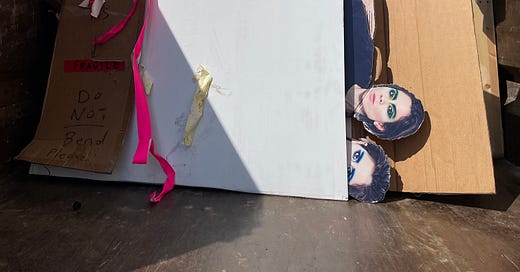



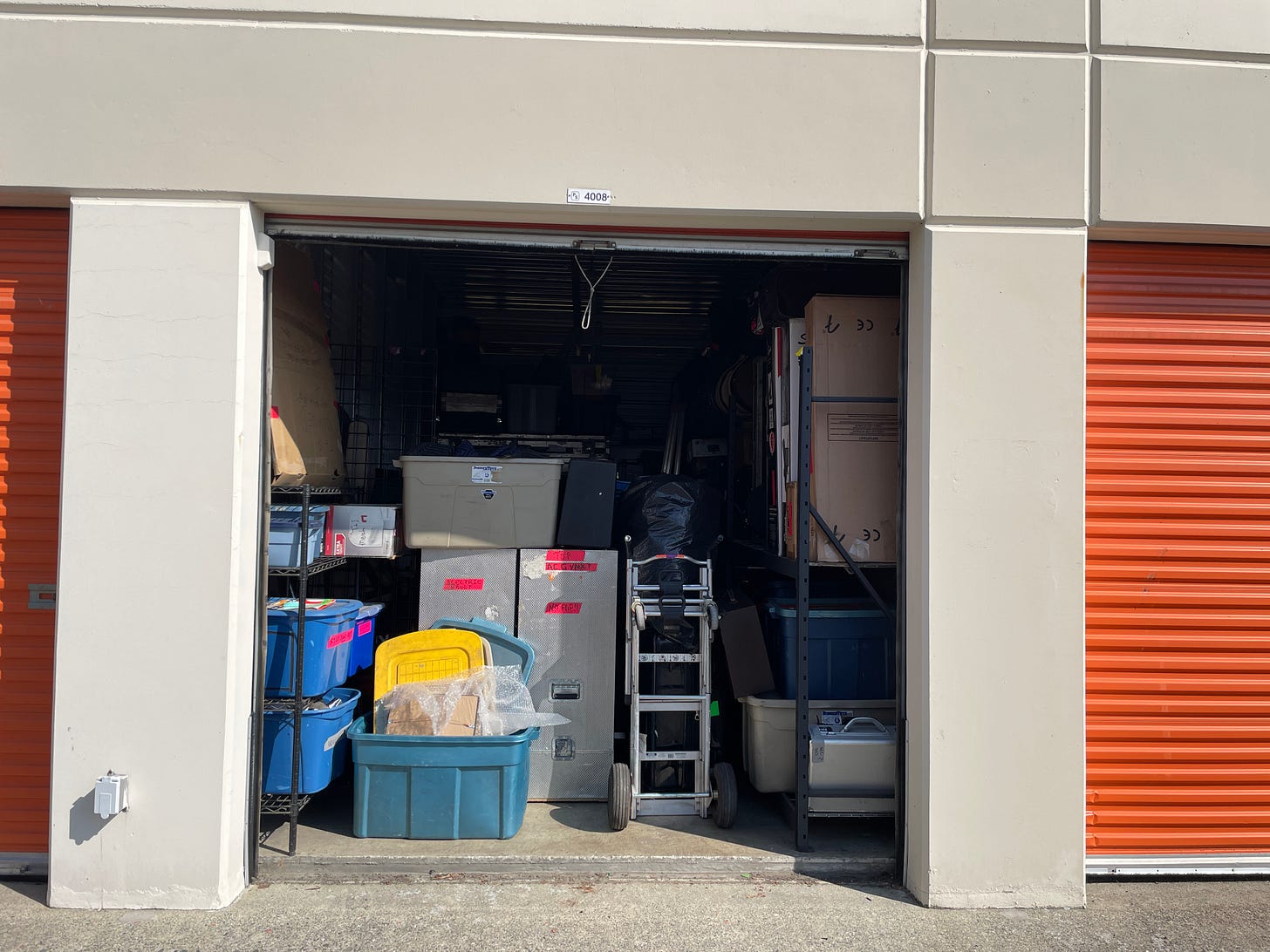

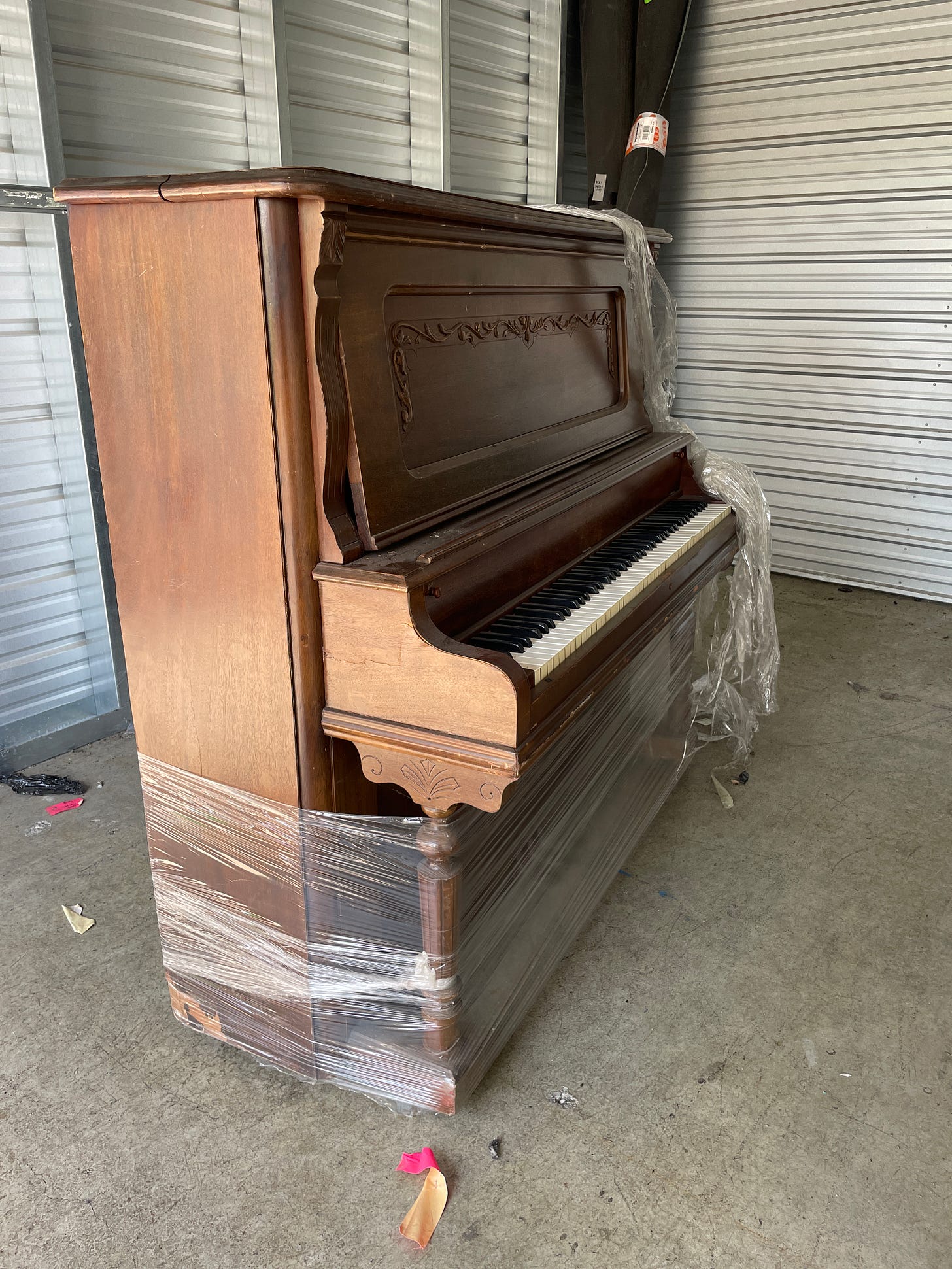



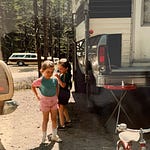

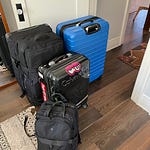



Share this post